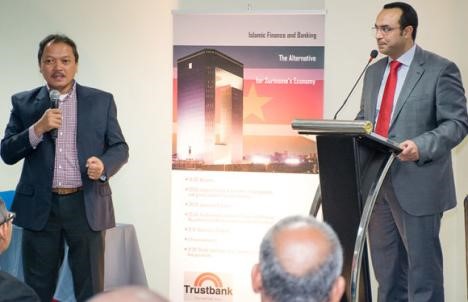

Trust Bank of Suriname majority shareholder Jim Rassam (L) and Mohamed Maher Mannai, Manager of Islamic Financial Institutions Program at ICD-Islamic Development Bank Group (Jeddah). Photo: United Suriname.
PARAMARIBO, Suriname, October 29, 2015.- In an effort to expand its economic partners, Suriname has forged strong ties with the Islamic world by accelerating its engagement with the Organisation of Islamic Cooperation (OIC) over the past five years. Paramaribo has now positioned itself as the leader in Islamic banking in the region in and is looking to exploit this lucrative industry that has gone global.
Experts on Islamic banking, Mohammed Mannai, Dr Said Bouheraoua, Dr Ibrahim Al Saywed and Louai Khojali, sent by the Islamic Research and Training Institute (IRTI) of the Islamic Development Bank Group, are this week in Suriname conducting classes on Islamic banking at the request of Paramaribo.
They will also visit neighboring Guyana, whose ties with the OIC have always been shaky. Guyana rarely attended OIC meetings and knows little about the OIC and its organs. The previous government failed to capitalize on OIC funds. The four-member delegation will hold talk with the new government of Guyana on Islamic banking this week in Georgetown.
Jim Rassam a businessman, who holds a majority share in the Trust Bank of Suriname, has been in the vanguard of initiating the Islamic financing (Sukuk) industry. The Trust Bank has been certified as the first Islamic financial institution in Suriname and the Caribbean. The staff of the bank is currently being trained to take up their positions soon.
Suriname’s deputy governor to the Islamic Bank, Dr Anwar Lall Mohamed, said the bank is «good for farmers and small entrepreneurs. It is industrial and production friendly.» He added that his government is happy of the growing collaboration with the bank that «leads to the economic development of Suriname.»
Acting head of the Central Bank of Suriname, Ingeborg Geduld-Nijman, said in a press release «Islamic finance has the potential to be a greater financial integration. It can provide support to small and medium-sized enterprises, because it prohibits speculation and based on risk sharing.”
With the support of the government and the private sector, Suriname wants to position itself as the Financial Centre for Islamic Banking, and as the financial hub for the region according to Wilfred Leeuwin of United Suriname.
Suriname has been tapping all the help it can get from the OIC and its organs, the Islamic Development Bank, the OIC Standing Committee for Economic and Commercial Cooperation (COMCEC), and the Statistical Economic and Social Research and Training Centre for Islamic countries (SESRIC).
The Bouterse administration, which is back in power and had initiated this relationship some decades ago, has renewed and expanded ties with the Islamic Bank. Suriname has secured many interest free loans from the bank in the past five years and is looking to double that amount soon.
Suriname has had some economic hiccups recently due to the decline in commodity prices, and OIC financial experts are assisting the country in dealing with these setbacks. OIC financial officials meet in Suriname next month, and they will hold several workshops to address economic problems facing the group of 57.
